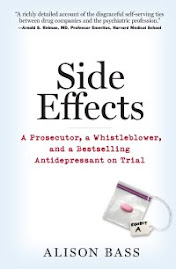Before I get to the gist of Raeburn's accusations, let me just point out that this isn't the first time that Dr. Mayberg, a neurologist at Emory University School of Medicine, has been less than forthcoming about her conflicts of interest. Mayberg was one of the authors on a 2006 paper that touted the effectiveness of a technique known as vagus nerve stimulation (VNS) in patients with treatment-resistant depression. Eight of the authors, including Mayberg, failed to disclose they had consulting ties with Cyberonics, the maker of the device that delivers electrical pulses to the vagus nerve in the neck. (The ninth author was an actual employee of Cyberonics). Because of this egregious failure to disclose, the lead author of the study, Dr. Charles Nemeroff, then chair of psychiatry at Emory, was forced to step down as editor in chief of the journal Neuropsychopharmacology, which published the VNS paper; read about the controversy here. Indeed, Nemeroff, who brought Mayberg to Emory, was forced to step down as chair at Emory last year after a Senate investigation found that he repeatedly failed to disclose to university and NIH officials the millions of dollars he was receiving from drug companies whose products he was touting in research papers and on the lecture circuit; read more about this here.
Mayberg also did not disclose the fact that she was a consultant for Advanced Neuromodulation Systems, a company that holds the patent on her surgical technique for deep brain stimulation, when she co-authored another 2006 article with Nemeroff that reviewed possible brain mechanisms for post traumatic stress disorder and concluded that Paxil might be an effective treatment for PTSD. The study, published in the Journal of Psychiatric Research, was funded by GlaxoSmithKline, the maker of Paxil. While Mayberg wrote about the possible involvement of Brodmann's area 25 in the brain in causing symptoms of PTSD, she did not disclose that she holds a patent for deep brain stimulation of that particular section of the brain or that she was a consultant for the company that is doing clinical trials on her surgical technique.
In my blog last week, I had reported that in her keynote at the Science Writers conference, Mayberg did not disclose that she is still a consultant for ANS, which also goes by the name of St. Jude Medical Inc. She did mention that she had a patent on the technique (which involves implanting electrodes in Area 25) and she referred on one slide to being a consultant for St. Jude Medical. Now, St. Jude Medical is a nonprofit hospital in California and so I (and others in the audience) assumed she was consulting for a nonprofit, not the for-profit company that is doing clinical trials on her patented technique. According to Raeburn who got in touch with Mayberg after I posted my blog, she said that "a review of her slides show that both ANS and St. Jude were disclosed." Now, maybe the good doctor does have a slide with ANS on it, but she did not put it up on the screen Nov. 7 and she did not mention it in her talk.
In my original blog, I also said that her "talk was heavy on anecdotal examples but skimpy on any real evidence of efficacy." She did say she was writing up a paper about her latest results but didn’t disclose much in the way of specifics. After I posted my blog, a reader sent me a summary of Mayberg's most recently published work on deep brain stimulation in UptoDate, a subscription only newsletter. Here it is:
“A case series of 20 patients with major depression unresponsive to more than 4 antidepressants and ECT (17 of the 20 patients) who underwent DBS with subcallosal electrode placement found response and remission rates to be 60 and 35 percent respectively at six months [49].”
A remission rate of 35 percent on 20 patients doesn’t seem that encouraging to me. More to the point, why didn’t Dr. Mayberg share this data with all of us science writers on Nov. 7?


